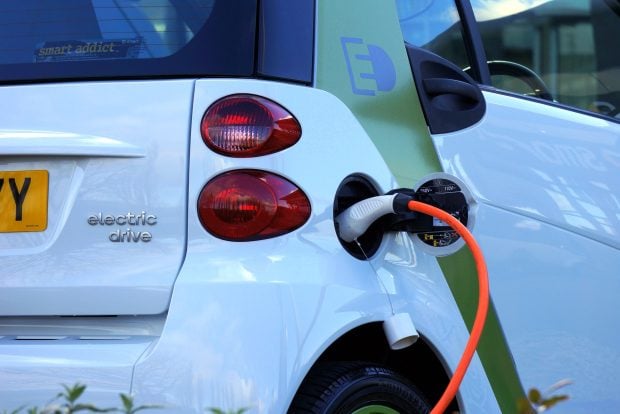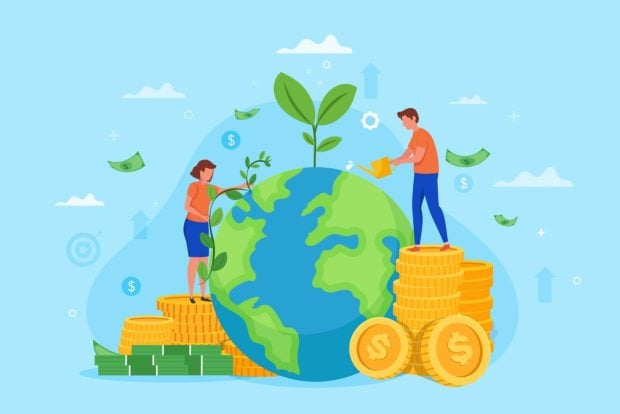‘An active role for the state’: can net zero and the green deal kickstart the global economy?

Governments have substantial ability to use fiscal policies to influence and craft the path to net zero, experts on a Global Government Forum webinar have indicated – but many governments responses to COVID-19 have not focused on taking the opportunity to help green national economies.
In the webinar entitled ‘A sustainable income: fiscal policies for a green economy’, panellists highlighted the extent to which governments need to act to reduce carbon emissions by setting the right incentives in their economy – through both public spending and taxation.
Speaking in the session, Joy Aeree Kim, the green fiscal policy team lead in the economy division of the United Nations Environment Programme (UNEP), highlighted that it was important for governments to build resilience to climate change. However, research by the UNEP in collaboration with the University of Oxford found that of the US$3.11 trillion spent on recovery from the coronavirus pandemic, less than one third (31.2%) could be classed as green spending.
This represents a missed opportunity, she said. “The IMF [International Monetary Fund] also shows that the economic multiplier of economic recovery vis-à-vis the business as usual, would be seven times higher. We could have actually set the direction of our society and economy in a different way.”
This does not mean that all hopes for greater sustainable thinking in fiscal policy are gone. As Kim highlighted, there are a number of areas where governments could look to take action to both improve their fiscal position and their environments.
Chief among these is revisiting systems of fossil fuel subsidies, which are estimated to range between US$370bn to as much as US$6trillion when the industry’s full externalities are accounted for.

Such an approach would have a two-pronged benefit, argued Kim (left): reducing the impact of carbon emissions and creating fiscal space for other policies. The IMF has estimated that eliminating fossil fuel subsidies, if combined that with the taxing fossil fuels, could cut premature air pollution deaths by more than half.
“There is a huge benefit in terms of removing fossil fuel subsidies to create a positive impact on our health, and reducing pollution,” she said.
The IMF has found that reform of fossil fuel subsidies could free up to US$3 trillion of public funds. Kim highlighted examples of this, including Indonesia’s removal of gasoline and diesel subsidies – which saved the equivalent of 10% of government expenditure – and Morocco’s reforms, which opened up investments in clean and renewable energy. Over 80 countries have included some element of fiscal policy lever in their nationally defined contributions to tackle climate change, whether changes to fossil fuel subsidies, or carbon taxes.
Read more: Investing energy: what’s needed to fund the transition to a green economy?
Climate change and inclusive growth ‘twin challenges’
Peter Lim, the director of the fiscal policy directorate at Singapore’s Ministry of Finance, set out the wider economic picture in which countries are making these kinds of decisions. After World War II, there was what he called “a virtuous upward spiral” around the world, where technology was improving rapidly and almost every region was experiencing growth and economic convergence.
This led to a remarkable rise in living standards, but in the last 40 years – and especially in the last two decades – this has not been sustained, he said.
“Frontier productivity halved and inequality within and between countries widened… and all these happen while global debt skyrocketed to its highest level as a percentage of GDP.”
Lim stressed that climate change can only be addressed alongside decisions to once again create more inclusive growth, which represents the twin challenges of our time.
“There’s nothing sustainable about our ever-increasing debt, there’s nothing sustainable about ever increasing consumption of limited natural resources.”
Governments around the world must be honest about the challenge of climate change, and what that challenge implies about the role of the state. “We take a lot of pride in democratic societies that people can speak truth to power,” Lim said. “But too often nowadays, those in power have not told the truth to the people about what the costs were the challenges of climate change, and the differences are papered over and then problems thrown up.”
Making a further point to his comment, Lim said: “We take a lot of pride in our social democratic models that everyone chips in and the state provides, but too often, it is often just the second part of that compact, but without that shared responsibility is very difficult to have a shared vision.”

Lim said there is a macroeconomic case for building the carbon taxes, provided the carbon tax has wide enough coverage of the economy to be effective – but it needs “a new active role for the state”.
“You must remember that we are dealing with very significant structural headwinds, and many of the issues of inequality and stagnation run very deep. We cannot just lay on an array of carbon tax and transfer and hope for the best. I think our green effort must be part of the solution in restarting that virtuous upward spiral.”
There are three elements where the government can make interventions to boost the green economy, he said. These are an active labour market policy to provide the skills needed for the transition, coherence of green and net zero plans with existing social and economies strategies, and supply side financing of the developments that are needed.
“I know it’s not easy, but I think if you’re honest, and we have a comprehensive plan, and we can think actively about this new role of the state, I think we can address this together.”
Sustainable technology
Valentina Ion, the director strategy in worldwide government at Microsoft, discussed the role that technology can play in such a transformation. Digital provides opportunities for sustainability, she highlighted, such as helping to properly report on emissions, and replacing carbon-intensive activities like commuting with remote work.
Microsoft is committed to building a more sustainable future through its own efforts, including being carbon negative by 2030 – to the extent that it has removed all historical emissions by 2050 – “not only being green and sustainable in the present, but reducing the impact we have had in our history,” she said.
Microsoft has also developed a planetary computer designed to protect and restore ecosystems through geospatial analysis and artificial intelligence, and providing data that can be used for conservation planning, to forecast the availability of water or predict deforestation.

“We’re already working with many governments and NGOs, as well on water security, on deforestation, biodiversity, climate, flooding, risk, and so on,” Ion added.
Inside the European Commission’s green deal
Miguel Gil Tertre, the head of unit, economic analysis and foresight, recovery in the European Commission’s directorate general for energy, spoke at the session to set out the EU’s green deal. This is the bloc’s strategy for sustainable economic growth and reaching net zero by 2050, and is intended to provide a framework for national budgets, which have to send the right price signals to the market.
“National budgets play a key role in the transition [and] green budgeting tools should help to redirect public investment consumption and taxation to green priorities and away from harmful subsidies.”
He said that the commission will work with member states to screen and benchmark green budgeting, which he said is becoming “even more unnecessary” in light of Russia’s invasion of Ukraine. “A reduction of the dependence on fossil fuels is not only good from economic point of view and the environmental point of view, but they’re also good from the point of view of the security of supply and the strategic autonomy. The case is even bigger than ever.”
The targets of the Green Deal are “very ambitious”, he said, and a smart policy framework is needed to incentivise actions, and fiscal policy has a key role to catalysing action through both regulation action to de-risk the transition to net zero.
However, Tertre also highlighted some of the challenges of the drive to net zero. He states that the definition of what is green or sustainable investments is not universally shared.

“From the point of view of the European Commission, for us, it is very important to have a science-based approach,” he said.
“There are clearly items who are green in the definition that we apply – reducing greenhouse gas emissions. There are other types of investments that might have a role in decreasing total greenhouse gas emissions, even if they continue to emit – this is the role of certain transitional activities. This is how it has been defined in the context of the taxonomy. And then there are things that clearly we want to get rid of – highly contaminating fossil fuels, like coal, for the generation of electricity. So, the challenge is not on those activities are those that are pure green, but the challenge is, where do we put the cursor for those [that are not]? As I said, for us, the science-based approach is best.”
Other challenges highlighted by Tertre included the differing speed that European member states are adopting green budgeting.
“The Commission did a survey last year on, you know, green budget practices and how these are defined,” he said, “We have five member states that apply environmental impact assessments, we have six member states that, don’t do green budgeting, but they track the different activities within the public budget according to their contribution to green objectives. Then we have six member states that have plans for green budgeting, and we have 10 member states that have not yet showed an intention to perform green budgeting.”
Other panellists also highlighted challenges in driving the green agenda. Kim noted difficulties in setting the optimal level of environmental taxes. “Particularly when it comes to pollution taxes, it is difficult to set the optimal tax rate due to the inconsistency and toxicity related to the pollutants, [and] that are still in many developing countries administrative limitations and capacity to implement environmental taxations and collect revenues.”
Lim agreed that in many emerging markets, there’s significant economic scarring from the coronavirus pandemic, “which means they’re not going to get back to your pre COVID growth trajectory anytime soon”.
He highlighted that the virtuous upward spiral had further fragmented during the pandemic, but it could still be the motivation to make the changes that would lead to the role of the state that he said is needed to reach net zero. Following on from Tertre’s presentation, he said that Europe had been most able to use the pandemic to signal as much as possible leadership change.
“The way I put it: if you think about the external trends and the issues you [as a government] have, it’s gotten worse in COVID, and there’s almost nothing that got better with COVID,” he said.
“But the one thing that has changed a lot from this crisis, I think, is the intrinsic desire to do better. We’re exposed to our own fragilities, so there’s a desire to do better, build a better future, and it’s really a matter of leadership.”
The Global Government Forum webinar ‘A sustainable income: fiscal policies for a green economy’ was held on 8 March 2022, with the support of knowledge partner Microsoft. You can watch the 75-minute webinar via our dedicated event page.





















